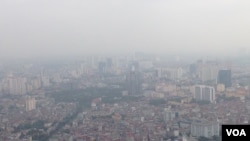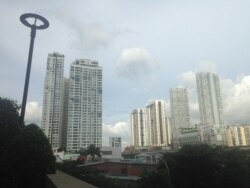A division of the World Bank has just made its first so-called "green loan" to a bank in Vietnam, meant for businesses to help with environmental problems in a nation that has one of the world’s highest emissions rates relative to its economy. Vietnam has a fast growing economy but also has a fast growing pollution problem.
The loan package of $212.5 million to VPBank was announced this month under the Green Loan Principles, a voluntary set of international guidelines to make loans for eco-friendly projects, such as to promote solar power or biodiversity.
In explaining why it packaged the loan, the World Bank’s International Finance Corporation (IFC) said that Vietnam is the most “carbon intensive” nation in the Asia Pacific region, after China and Mongolia. Carbon intensity measures how much carbon dioxide a nation emits for every dollar of gross domestic product (GDP) it generates. In other words Vietnam’s economy costs a lot of greenhouse gas, and the IFC hopes loans like this one can help reduce the pollutants.
This meets a “strategic objective of increasing financing for climate-smart initiatives to boost environmentally sustainable development in emerging markets with high potential of greenhouse gas emissions reduction such as Vietnam,” Rosy Khanna, the IFC financial institutions group director for Asia Pacific, said.
She said there is “high interest” among investors to provide a “source of capital while helping the country tackle climate change at the same time.”
Climate problems mean Vietnam has a business opportunity that the IFC values at $753 billion for investors looking to tackle them.
The Southeast Asian nation has one of the highest GDP growth rates in the world but that growth is causing worry about the potential impact on the environment. Vietnamese citizens are increasingly worried about everything from the plastic rubbish that is ending up in the ocean, to the toxic chemicals that could be polluting their food and water supply. Khanna said Vietnam has a lot of potential to reduce emissions, but the reason emissions are so high is that the nation is increasingly generating electricity through coal, the dirtiest source of energy.
VPBank, officially known as the Vietnam Prosperity Joint Stock Commercial Bank, said it would use the loan to invest in alternatives.“
This is also an opportunity to help VPBank make positive contributions to national objectives by providing financial solutions to the segment of corporate customers investing in eco-friendly projects, such as renewable energy, national energy security, energy efficiency, green buildings, green transport, [and] waste treatment,” the bank said in a press release.
The IFC has also collaborated with businesses to facilitate green finance in other developing nations such as Costa Rica, Egypt, India, Mexico, and Ukraine.
It said the loans in Vietnam would likely be used for green infrastructure, in addition to energy projects, particularly involving small or medium size businesses.
VPBank has committed to setting up a management system to ensure accountability for the green loan, allowing it to record and monitor the types of green projects the loan finances, as well as allowing for third party verification.







